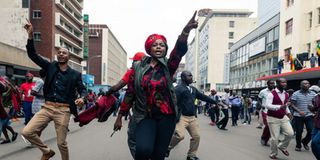Premium
Zimbabwe bans by-elections citing Covid-19

Supporters of the Movement for Democratic Change Alliance in Harare on November 20, 2019.
What you need to know:
- The ban announced by Vice President Constantino Chiwenga, who also doubles up as Health and Child Care minister, coincided with a mass recall of opposition legislators under controversial circumstances.
- Alex Magaisa, a Zimbabwean constitutional law expert based at the University of Kent in the United Kingdom, said the ban was evidence that President Emmerson Mnangagwa was using the Covid-19 to stifle democracy.
Zimbabwe on Friday banned by-elections to fill vacant parliamentary and local government seats citing the Covid-19 pandemic.
The ban announced by Vice President Constantino Chiwenga, who also doubles up as Health and Child Care minister, coincided with a mass recall of opposition legislators under controversial circumstances.
Zimbabwe’s electoral commission last month had announced that by-elections to fill at least 35 parliamentary and 84 local government vacant seats will be held on December 5.
However, Mr Chiwenga’s ban issued through a statutory instrument says the polls will not be held as long as Covid-19 remained a “formidable epidemic disease.”
Alex Magaisa, a Zimbabwean constitutional law expert based at the University of Kent in the United Kingdom, said the ban was evidence that President Emmerson Mnangagwa was using the Covid-19 to stifle democracy.
Critics warned that Covid-19 would present an opportunity for dictators to mount an assault on democracy,” Dr Magaisa said.
“Statutory Instrument 225A effectively banning by-elections in Zimbabwe is living proof of it.
“(President) Mnangagwa is lifting restrictions in other areas, but not in elections
“But the legality of this statutory instrument is doubtful.
“It seeks to amend not only the Electoral Act but also the constitution.
“The Health minister does not have power to do that.
“Second, the statutory instrument cannot operate retrospectively as it seeks to do. It’s all very clumsy.”
The majority of the seats became vacant after a rival party was allowed to recall legislators from the mainstream opposition MDC Alliance led by Nelson Chamisa.
Under Zimbabwe’s electoral laws a country, a party can recall legislators or councillors if they no longer representing its interests.
In this case, the MDC-T led by Thokozani Khupe was, however, allowed to recall members of a party it contested against in the previous elections.
Mr Chamisa, who narrowly lost the 2018 presidential elections to President Mnangagwa, accuses the 77 year-old ruler of using the courts and Parliament to strangle his MDC Alliance in order to create a one party state.
Problems for the MDC Alliance started in March when the Supreme Court ruled that Mr Chamisa's succession of the party's late founder Morgan Tsvangirai was illegal.
The court handed the leadership of the party to Thokozani Khupe on an interim basis until a congress is organised to find Mr Tsvangirai's successor.
Mr Chamisa's group, however, described the ruling as moot since they had split with Ms Khupe's MDC-T to form the MDC Alliance before the 2018 elections.
The two parties contested the controversial polls separately with Mr Chamisa polling two million votes against Ms Khupe’s paltry 45 000.
After the polls Ms Khupe forged a dialogue platform with President Mnangagwa while the MDC Alliance refused to recognise the ruling party candidate saying he rigged the polls.
With Parliament's approval and government endorsement, Ms Khupe is now recalling all MDC Alliance legislators, councillors and mayors that have refused to recognise her.
President Mnangagwa succeeded the late Robert Mugabe following a military coup three years ago. Mr Chiwenga was the army commander at the time of the military putsch.





